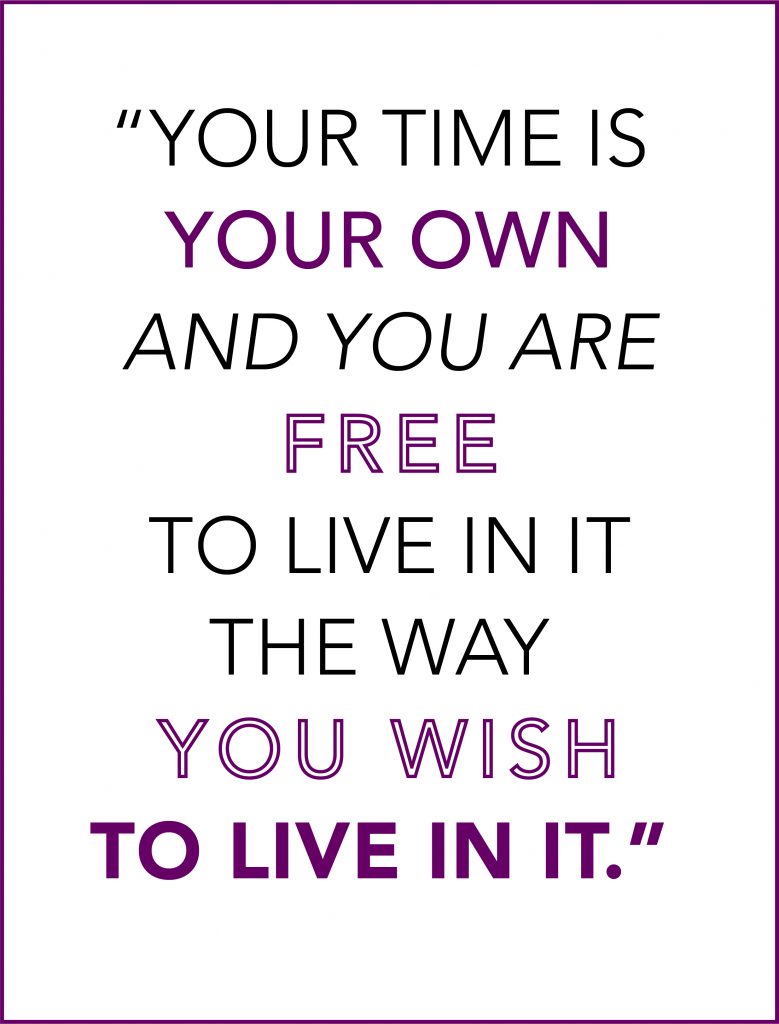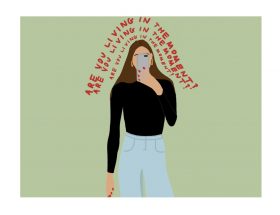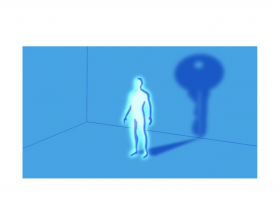“The versatility of time”, I thought to myself while figuring out what I wanted to write for the upcoming issue of BRIZO magazine. I kept thinking and I kept getting stuck on the concept of time – what could I write about time? Who was I to reflect on the metaphysical reasoning behind time? I’m anything but a philosopher. I kept coming up with things that I was nowhere near qualified to write about, which resulted in panic as I saw the deadline creeping closer every day. However, as I was lying in bed, thinking about my deadline, I started wondering why could I not keep a deadline to save my life? Why was it so hard for me to respect a given time frame?
There are a great deal of things that can impact the way we perceive time. One could, for example, perceive and measure it in terms of our relationships to the people around us, or perceive time in reference to what is going on around the world, or even just by means of our physical locations. Traditionally, people like to measure time in terms of their accomplishments, usually professional ones. The inherent abstraction of the concept of time however, presents us with a barrier that stops us from having a fixed explanation of what time is and how to measure it, which makes it harder for me to understand it at times. But the lack of definition, opens up worlds of possible interpretations of time and how it could impact us personally.

Now, before I start I’d like to state that I am by no means claiming that I have figured out what time is and how it should be measured, I am merely offering my personal perspective on the passing of time and how I understand the concept.
When I think about the passing of time throughout my life, I am faced with two opposite perceptions that ultimately seem to happen in congruence. On the one hand, I often find myself stopping and thinking about the time that has passed. By that I mean, I could be sitting in a coffee shop somewhere, desperately trying to study, which leads me to order a pastry that I haven’t had in years but that I adore – a huit a la crème. When I take my first bite, I am transported back to studying in the cafeteria of my secondary school, again, desperately trying to study, and suddenly I realise that it has been 4 years since I’ve had a huit a la crème. Four years is a lot of time objectively, but you cannot, or at least I cannot, really quantify what four years is or means. Of course, you can quantify it numerically – we all know that a year has 365 days. But do those 365 days really feel like 365 separate days? To me, they seem like elongated weeks when I think about them. Years feel like weeks, weeks feel like days, days feel like minutes and minutes feel like seconds – you get the picture.
But on the other hand, right after thinking about how the shadows of past years and past “me’s” have crept by without even saying hello or goodbye (rude, if you ask me), I am hit by another feeling – the feeling of never-ending days. I would say that this is the state I am in most of the time. Minutes become hours, hours become days, days become weeks, weeks become years, years become decades. An unbearable feeling that time seems to be stuck and that you seem to be stuck with it, which is maybe why I am so shocked to find that so much time as gone by when I sit and think about it.
I know that I have felt this way for most of my life, but have others? Is this something everyone experiences? A meta-study by psychologists at the Johannes Gutenberg University Mainz (JGU) exploring the experience of time and how it is altered found that there is a difference in the way that depressed individuals assess the flow of time and perceive the duration of a given time frame. This incongruence in time perceptions between depressed patients and control patients applies to the evaluation of time periods rather than objective time intervals such as two seconds or two minutes, where depressed patients were found to be no different than control patients. Overall, while depressed patients were able to affirm the objective length of an external event, it was their subjective feeling of the passage of time that was affected by their mental health condition.
So, mental health can strongly contribute to a distorted view of time, particularly in cases of depression, dividing time into two entities: “self-time” and “world-time”. The desynchronization between the patient’s own time and others’, or the world’s time, is salient in depressive states. But why does this happen on a physiological level? For years, the research area concerning itself with mechanisms of mood disorders such as depression have found that the working memory mechanisms and attentional control of patients with depression are increasingly affected depending on the severity of the disorder. With that in mind, research regarding the perception of longer time intervals theorizes that the processing of long durations of time seems to require more attentional resources, resources that are already lacking in patients with depression. Thus, the increased exertion required to process longer periods of time is exacerbated in patients of depression, possibly leading to the impression that more time has gone by.
While the empirical data on the perception of time in mood disorders is scarce, it is fair to hypothesize that anxiety also affects individual perceptions of time. In my experience with anxiety, an anxiety attack will feel like a combination of time going fast and slow. My head will be filled with thousands of thoughts and I’ll be able to feel my heart in my throat making it seem like I am running without even moving. Every second that passes I am running faster and faster, running aimlessly to an unknown destination. But simultaneously, the faster I run the further my goal is away and the longer I have to run to reach it, elongating the experience to the point where it resembles a Sisyphean task. Every attempt to slow the horses seems to be fruitless and simply encourages them to run wilder. As a psychology student interested in the neuropsychological aspects of mood disorders (and a Virgo), I am obsessed with the mechanisms behind these types of experiences. Physiologically, anxiety is the dysfunctional activation of the amygdala, otherwise known as the “fear-centre” of our brains. This area of our brains is activated when we are faced with fearful stimuli, which can come in all shapes and sizes when you suffer from anxiety. Once fearful stimuli are perceived, our amygdala and subsequent fear responses are triggered. The time frames in which we experience fear responses are perceived as longer than periods of non-activation. That being said, is it really fair to dismiss the experience of an anxiety attack or a depressive state as a neuropsychological dysfunctionality? I don’t think so.
Distorted perceptions of time in depressive states as well as during anxiety attacks are, in my opinion, aspects of mood disorders that are not considered enough. Yes, we talk about the lack of attention. Yes, we talk about the difficulty in completing tasks, but we do not talk enough about what it feels like to be stuck in your own head for what seems like an eternity – no end in sight, no light at the end of the tunnel. There seems to be a lot of resources using cognitive strategies to target the content of the thoughts going around in the carousel that is the human mind, but I believe that it is the desynchronization in perceptions of time that we should consider more in depth.
I would like to state that I am not qualified to give any kind of clinical advice and that I am merely voicing my opinion based on my experiences with mood disorders such as depression, anxiety, and dissociative states.
When our self-time is desynchronized with the world-time or even just the time of those around us, I believe that it drives an unceasing sensation of loneliness. A feeling that the time that you are experiencing is completely isolated from everyone else’s time – a feeling that, in my opinion, is a gateway to genuine loneliness. It almost feels like those scenes in movies where a character finds themselves in a fully white space, a complete void, where no one can hear them, no one can see them and they are alone until they figure out a way to connect back to reality. And what happens when you are not stuck in your perception of self-time, but it seems like you no longer have any sense of awareness of your self-time and your self-time is no longer your time at all? Individuals with dissociative disorders are often alienated from their bodies leaving them in states where they might be unable to accurately perceive the passing of time as marked by external events, often leaving them in a state of confusion about the amount of time that has passed or the moment in time that they find themselves in. How do you even begin to process things that happened around you without actively remembering being a participant? How do you reconnect to your self-time?
How do you deal with the fact that you have fallen behind on the world and the time that everyone else seems to be living in? This has always haunted me, because I have always felt like I needed to be catching up to something, or to someone, or to the world – like I was falling behind in school, like everyone was running but I was still struggling to walk. Recently, however, while lying in my bed trying to soothe my racing thoughts about my life, my future and everyone else’s lives and futures, I found that really the only way that I could deal with the fact that, in my mind, I was behind is to acknowledge that I wasn’t behind at all. I found that the way to be okay about not being at the head of the race, was to realize that we shouldn’t be racing at all. Everyone’s journey through life is completely their own and can fundamentally not be compared to the journey of others. Why? Simply by virtue of the fact that none of us, even in the case of the most improbable of coincidences, can ever have the exact same experience of life. And more importantly, I found that if I was feeling this way, then it was likely that everyone had at least once in their lives felt like they were falling behind, like their self-time wasn’t in congruence with the world’s. So why race to catch up to others or to be at the same level as them?
I don’t want to be cliché and say that time is a construct, but when you consider it in the context of an individual’s mental health and the impact that their distorted perceptions of time can have on their feeling of belonging to a larger societal group, it has and is, in my experience, been useful to understand that you are not an exception within that group. You cannot fall behind or be out of sync when no one is in sync in the first place. Everyone has their own time and way to follow. Sure, we may be walking alongside one another but we are not, and we will never be following the same way as someone else. Your time is your own and you are free to live in it the way you wish to live in it – a thought that I have struggled with and still struggle to accept to this day. But the fact is that time is versatility and without versatility, there is really no point at all. Take your time to heal, take the time that is yours.
In a world that tries to strip us of all personal freedom and expression, that tries to make us believe that we have somewhere to be and that we have something to live up to, that tells you it is not okay to struggle to keep up with the insane rhythm dictated by the clock on Jeff Bezos’ wrist, taking your time is revolutionary.

art by Alcira Hava




